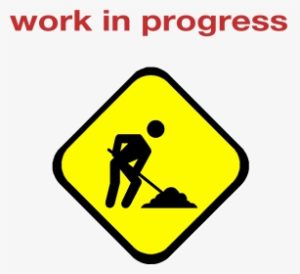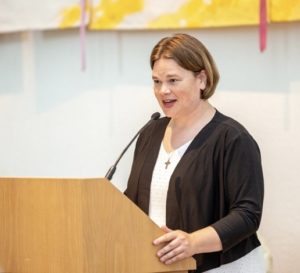
“Above all, trust in the slow work of God… Give Our Lord the benefit of believing that his hand is leading you, and accept the anxiety of feeling yourself in suspense and incomplete.”
Long before I had any knowledge of Teilhard de Chardin’s theological and paleontological work, long before I knew anything about the Omega Point or the Cosmic Christ, I knew these words. They were given to me as an undergraduate student at the Newman Center. Teilhard’s words have served as faithful companions through the twists and turns of young adulthood and entrance into religious life. Now that I am diving into Teilhard’s work, these evocative words take on new meaning for me.
I am a work in progress and you are a work in progress, amid other human beings who are works in progress. Collectively, we exist in congregations, institutions, and groups that are works in progress on a planet that is a work in progress. We are evolving. We are not finished yet. We are still under construction.
If you’re anything like me, you run into this truth over and over again within yourself, in interpersonal relationships, and in widening circles of community. It’s by turns exciting and confusing, chaotic and adventurous, frustrating and scary to be a work in progress at every level.
Within the Christian tradition, we speak of sanctification and the call to continual conversion. Paul writes about the need to grow up as Christians and go from milk to solid food (I Cor 3:2). Can insights from science – though in secular and not religious language – provide another lens to which to see this same charge to cooperate with God’s grace, to grow, to change, to evolve?
The name of this blog is “In the Beginning…” As Laurie and I were brainstorming names that would capture the essence of the questions driving our research, I insisted that the ellipsis (…) is important. The ellipsis implies the rest of the Genesis story and, by extension, the rest of the Bible. The ellipsis also points to creation itself as ongoing and unfinished.
There are two images I find helpful in sitting with this truth and reflecting on its implications. My novice director’s gift to me last summer when I made first profession of vows was a “work in progress” heart that I’ve kept on my altar. The pink soapstone heart is hand carved by machete by Kenyan artisans. Though it is clearly a heart, it’s unpolished and marked by uneven spots, rough edges, bumps, and chips. The gift card stated the heart is to “encourage you to embrace the process of being a work in progress.”
Secondly, in a 2014 lecture, my heart leapt when I heard theologian Elizabeth Johnson, CSJ say, “God sings the universe into being.” She went on to say that God doesn’t create the way a painter or sculptor creates, which implies a finished product which can displayed, a finished product from the artist can distance themselves. That would be deism – a clockmaker God.
Rather, a singer is intimately engaged with the creation of song in an embodied, active, ongoing way. The moment a singer stops singing, the song ceases. The moment God stops creating, creation ceases to exist. As a singer myself familiar with the effort, focus, and breath support necessary to sing, I found myself saying, “yes!” to Johnson’s words.
But if I’m honest, a part of me (okay, a big part of me!) doesn’t want the messiness and chaos and confusion of all this “in progess-ness.” It requires a lot of trust, surrender, patience, humility, and willingness to embrace the unknown – which, I admit, aren’t exactly my strong suit. (Just ask any of my Sisters in community!) As Teilhard wrote, I’d like to “skip the intermediate stages” and have a least a little less uncertainty. Yet it seems that a spirituality truly informed by the New Cosmology and the truth that God creates through evolution needs to embrace the reality of my/your/our existential incompleteness.
How do you think about yourself and our world as a work in progress, and God as a God who continually creates us?
What are the Scripture passages, stories, and images that help you to pray with the “the law of all progress that it is made by passing through some stages of instability – and that it may take a very long time?”

A note to commentators from Laurie Brink, OP: I am a Catholic Christian scholar for whom the Gospel directs not only my teaching, but my actions and hopefully my speech. I look forward to your insights, but I ask that in the spirit of Christian charity and courteous discourse you write with love and civility. Uncharitable or discourteous speech has no place in thoughtful dialogue.
“Let no evil talk come out of your mouths, but only what is useful for building up, as there is need, so that your words may give grace to those who hear” (Eph 4:29).
A comforting and honest encouragement to engage in the work of Incarnating the Presence, always recognizing the spaces and tensions where the Spirit is at work. I discovered Teilhard’s “Phenomena” at our library in 1969. His voice and imagination resonated, and it’s been a love story ever since.
A companion scriptural encouragement, which is important to me is: Wait for the Lord with courage. Be stouthearted and wait for the Lord”. ❤️
Thank you, Therese. It is delightful to hear that you have had such a “love story” with Teilhard’s thoughts over so many years. Thank you for reminding me of this Scripture passage which indeed points us to trusting in the slow work of God. I know this Scripture verse rendered in a simple Taize chant which I like to sing: “Wait for the Lord, whose day is near. Wait for the Lord, be strong, take heart.”
❤️ Taize chants are part of the fiber of my being🎶
A real love story as we approach St Valentine’s Day! 🙂
I discovered Teilhard at the time his books were first published in English in the early sixties(UK) when I was discerning my own call to religious life. I was so thrilled at the way he opens up such a cosmic vision. In the workshops I have given over the years, often using clay, paint , dreams, I like to use the term “human becoming” rather than human being. Like myself I find many people feel so relieved to think of ourselves as a work in progress. It says a lot about some of the images of the spiritual life some… Read more »
Thank you for your comment, Morag. I love the term “human becoming” – it certainly resonates with my own experience. I appreciate your insight that a benefit of this way of thinking does move us away from the really unhealthy tendency towards perfectionism, and specifically the unrealistic understanding of religious life as a “way of perfection.” Thank you for following the blog and supporting our research.
The beloved Sisters of St. Joseph of Carondelet, ever on the forefront, introduced the junior class of St. Joseph’s Academy to Teilhard in 1967, despite his monitum. For the first time, my faith made sense; we live in an Incarnational universe, a Christ soaked Cosmos, in which the Holy Spirit is ever creating and transforming all in imago Dei, while evolving the human nous towards Omega. So many resist that God is solely a male dominator, grateful that the Franciscan Sisters of Mary dropped the male pronouns, and the ancient Hebrew words of male domination, i.e. Lord, King et al.… Read more »
Thank you for your comment, Donna. What a gift that you were exposed to Teilhard’s thought at such a early stage of life. Yes, certainly limiting language and images for God to solely ones of maleness and domination is problematic. I think this is one of the reasons Johnson’s image of God as singer (not inherently gendered) also speaks to me, in addition to the idea of engaged, bodily, continual creation through breath (Spirit, ruah). Indeed, how we name the Trinity matters – and the Trinity is actually the topic of my next blog post, so stay tuned. Thanks again… Read more »
We are in progress. Yes, a collective WE.Creation is in constant movement, always becoming. The Creator’s image is never ending.Personally I do not believe that humans are the end of God’s handiwork. We along with all of Creation continue to evolve and disintegrate only to rise from the compost! The spirituality of the compost heap teaches me life never ends . All is transformed in becoming part of something else enabling the Devine to be experienced from another perspective that the present form is incapable of.WE are living in Eternity time. No time like the present where all are held… Read more »
Thank you, Caroline, for reminding us of the collective “we.” For those of us living in individualistic cultures where Christian spirituality can be presented as just “Jesus and me,” I think part of conversion is continually reconnecting to community and to the “we” that we belong to. The natural process of compost is another interesting and helpful image of the slow work of transformation.
“Saints in the Making” is the encouragement we give to our upper grade students; by all means, we are NOT finished nor is our evolving universe. We spend almost a semester delving into the Book of Genesis and interpret “in the beginning” with the inspiration of Chardin and O’Murchui. We draw, we role play and venture into the unraveling of the stories of our ancestors…the stories of our lives. Chardin restored my faith in the 60’s; may our study help
“renew the face of the earth”…as we continue to “emerge”
Thank you, Judy. “Saints in the making” is indeed helpful language for all us regardless of our age or place on the journey of faith. I am intrigued to hear that you delve into Genesis and draw on Chardin and O’Murchu. If you are willing to share any of your pedagaogical materials, I’d be most interested in seeing them, both for the sake of this research as well as because of my work teaching Laudato Si at Dominican University. Indeed – may we cooperate with grace in helping to renew the face of the earth!
I often think about how boring life would be if everything was fully developed and “perfect”. Especially after I’ve “blown it” , acted like a donkey, and embarrassed myself! Somehow, incompleteness gives hope.
Barabara, this is a great insight and a helpful and positive reframing of our human incompleteness. Indeed, the fact that we are works in progress helps keep us humble and trusting in God’s mercy, which is deeply hopeful. Thank you for this perspective, which helps me as a recovering perfectionist!